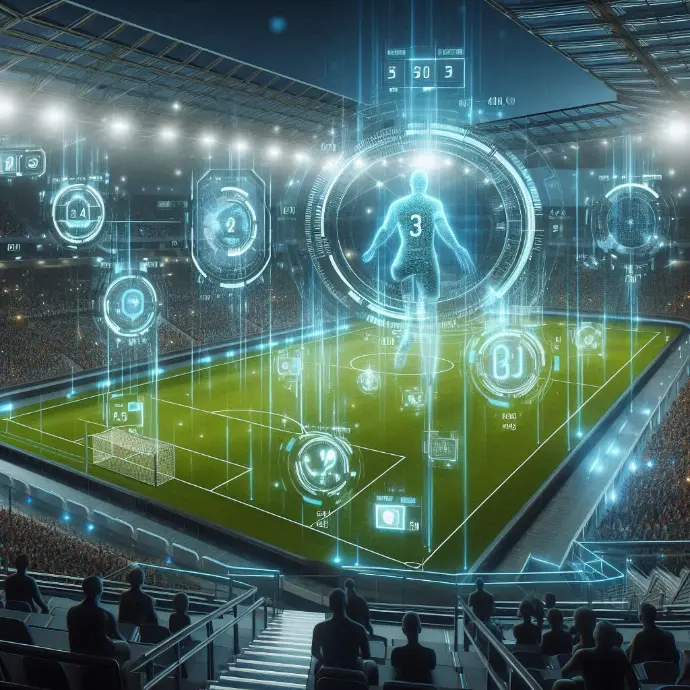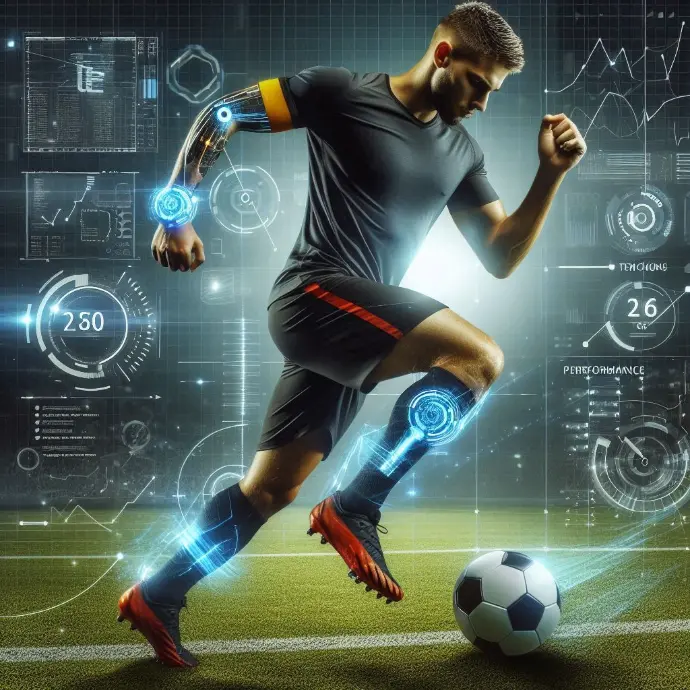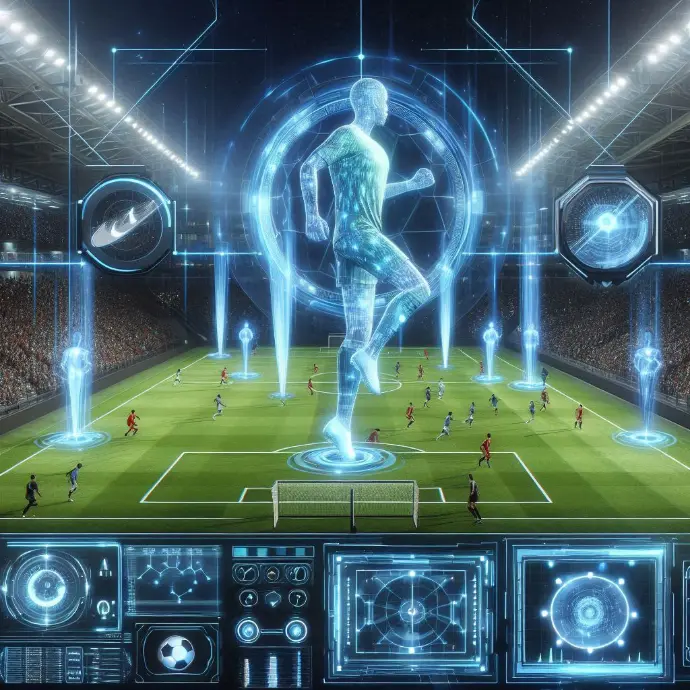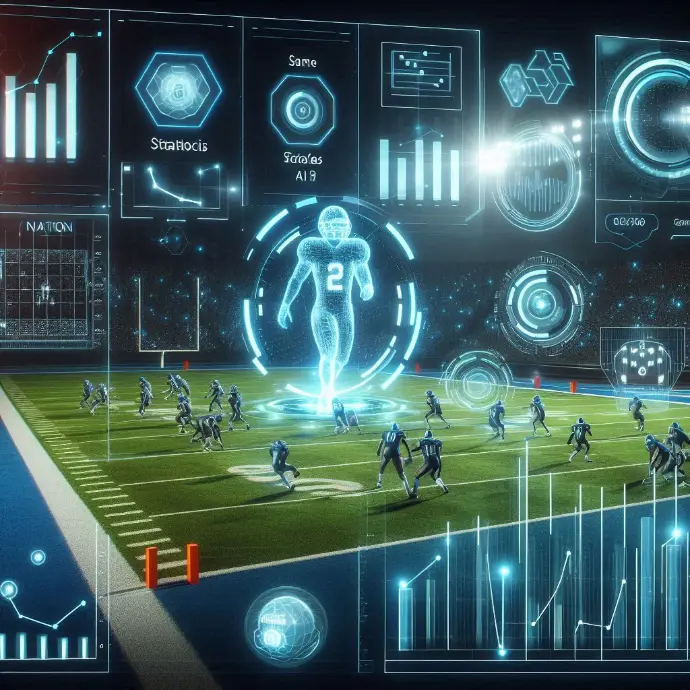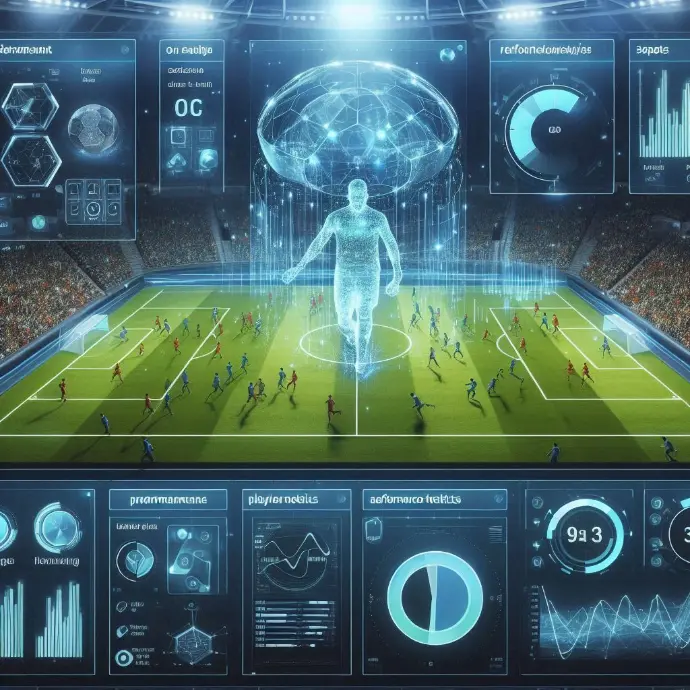Artificial Intelligence in Sports Performance Analysis and Game Strategies
Immerse yourself in the fascinating world of artificial intelligence applied to sports and discover how performance analysis and game strategies are being revolutionized by AI. Get ready to explore the impact of this innovation in the Artificial Intelligence category in depth. Ready to discover the future of sports?
Introduction
Artificial Intelligence (AI) has revolutionized numerous aspects of our lives, from healthcare to entertainment, and the world of sports is no exception. With the advancement of technology, AI has become an invaluable tool for analyzing sports performance and developing more effective game strategies.
AI in sports has become a powerful ally for athletes, coaches, and teams, providing detailed insights and predictive analytics that were previously inaccessible. Through the use of algorithms and advanced data analysis, AI can identify patterns, trends, and opportunities for improvement that are critical to success in high-level sports competitions.
Furthermore, AI has enabled teams and athletes to optimize their performance, minimize the risk of injury, and maximize their athletic potential, demonstrating the significant impact of this technology on the world of sports.
The application of AI in sports performance analysis offers a variety of benefits that have transformed the way athletes and teams approach their preparation and competition.
First, AI enables comprehensive data analysis, providing detailed insights into athletes' performance, team strategy, and game trends. This information is invaluable for identifying areas for improvement, making informed decisions, and adjusting training and game strategies.
Furthermore, AI can predict potential injuries by analyzing movement patterns and physical loading, helping teams implement more effective injury prevention strategies and keep athletes in peak physical condition.
The application of AI in sports performance analysis gives athletes and coaches a competitive advantage by offering accurate and actionable insights that drive performance and strategic decision-making.
AI plays a pivotal role in developing effective game strategies by providing advanced analytics and recommendations based on real-time data.
Using machine learning algorithms, AI can analyze game patterns, identify weaknesses in the opposing team's strategy, and suggest strategic adjustments to maximize the chances of success.
This real-time analytical capability allows coaches and teams to adapt quickly during matches and competitions, which can mean the difference between victory and defeat.
Furthermore, AI can simulate game scenarios and strategies, giving teams the opportunity to explore new tactics and assess their viability before implementing them in real-life competitions.
AI has proven to be an invaluable tool in developing game strategies, providing detailed insights, predictive analysis, and real-time recommendations that drive performance and strategic decision-making in the world of sports.
AI Applications in Sports Performance Analysis
Today, sports performance analysis using artificial intelligence has revolutionized the way athletes and teams improve their performance. AI has made it possible to collect and analyze vast amounts of data, giving coaches and athletes deeper and more accurate insight into their on-field performance. This technology has paved the way for data-driven decision-making, the identification of patterns and trends, and the development of personalized strategies for each player or team.
Thanks to AI, performance analysis in sports can now consider a wide range of factors, from playing technique and physical fitness to athlete psychology. This has led to a more holistic understanding of sports performance, which in turn has contributed to more effective training and improved performance in competitions.
At the professional level, teams in soccer, basketball, tennis, and other sports have enthusiastically embraced these emerging technologies, demonstrating the significant impact AI has had on sports performance analysis.
Emerging technologies have played a pivotal role in the evolution of sports performance analysis. These technologies include wearable devices for biometric tracking, high-speed cameras, motion tracking systems, and cloud-based data analysis platforms.
These technological advancements have enabled real-time data collection during training and competitions, which in turn has enabled detailed analysis of athletes' performance. The integration of AI into these technologies has facilitated pattern identification, injury prediction, training personalization, and optimization of game strategies.
Furthermore, the use of augmented reality and virtual reality has given coaches and athletes the ability to simulate game scenarios and visualize performance data in innovative ways, enriching the process of analyzing and improving sports performance.
Optimizing individual and team performance is one of the greatest benefits that AI has brought to the sports field. Using machine learning algorithms, AI can identify areas for improvement for each athlete, as well as playing patterns that influence the team's performance as a whole.
AI's ability to analyze historical and real-time data has allowed coaches and teams to adjust strategies, make tactical changes, and make informed decisions based on evidence. This has led to a significant increase in the efficiency and effectiveness of training methods, as well as the further development of more sophisticated and adaptive game strategies.
Ultimately, the integration of AI into sports performance analysis has marked a milestone in the evolution of high-performance sports, providing athletes and teams with the tools they need to reach their full potential and overcome challenges in a more informed and strategic manner.
The implementation of Artificial Intelligence (AI) in sports offers several competitive advantages that can revolutionize the way sports are understood and practiced. One of the main advantages is the ability to collect and analyze large volumes of data in real time. This allows coaches and athletes to gain detailed performance insights, identify patterns and trends, and make more informed and accurate decisions.
Another significant advantage is AI's ability to generate personalized game strategies. By analyzing player and team performance, AI can identify areas for improvement, propose specific tactics, and dynamically adapt strategy based on changing game conditions. This can provide a crucial competitive advantage by allowing teams to optimize their performance and maximize their chances of success.
Furthermore, the implementation of AI in sports can also contribute to injury prevention by analyzing athletes' biometric data and performance. By identifying patterns that may indicate an increased risk of injury, teams and coaches can adjust training and strategies to minimize this risk, which in turn can increase the longevity and quality of athletes' sports careers.
AI-Powered Game Strategies
Artificial intelligence (AI) has revolutionized the way sports teams develop personalized strategies to maximize their performance. By analyzing large volumes of data, AI is able to identify patterns and trends that escape the human eye, enabling the creation of strategies tailored to the strengths and weaknesses of each team and player.
By processing detailed information about player performance, such as speed, passing accuracy, stamina, and other relevant data, AI can generate targeted recommendations to optimize individual and team performance. This personalized approach gives coaches a significant advantage when designing tactics that align with their team's unique capabilities.
AI's ability to analyze and understand complex data sets allows sports teams to develop more precise and effective strategies, resulting in improved performance on the field.
The integration of AI into tactical decision-making represents a significant advancement in the world of sports. By collecting real-time data during matches, AI can provide instant analysis that helps coaches adjust their strategies on the fly. This real-time adaptation capability is critical to staying ahead in high-level competitions, where every second counts.
Furthermore, AI can assess opponents' performance and predict their moves based on historical data, giving coaches a more complete and detailed view of the opposing team's strengths and weaknesses. This information enables more informed and strategic decision-making during matches, which can make all the difference in the final outcome.
The integration of AI into tactical decision-making not only provides a competitive advantage but also contributes to the evolution of sports by encouraging a more analytical and data-driven approach to strategic decision-making.
AI not only offers retrospective analysis but also plays a crucial role in the continuous improvement of strategies through predictive analytics. By constantly evaluating player and team performance, AI can identify emerging trends, forecast possible scenarios, and suggest strategic adjustments to anticipate and respond to specific situations.
This predictive approach allows sports teams to prepare more effectively for future challenges, thereby optimizing their performance and increasing their chances of success. By harnessing the power of AI to predict potential outcomes, coaches can make more informed and strategic decisions, allowing them to stay ahead in an increasingly competitive sports environment.
AI's ability to drive continuous improvement through predictive analytics represents a significant advancement in sports performance optimization, paving the way for a future where strategic decision-making is informed by intelligent and proactive data analysis.
The impact of Artificial Intelligence (AI) on the evolution of sports gaming has been significant in recent years. The ability to collect and analyze large amounts of data in real time has revolutionized the way teams and athletes approach training, decision-making, and overall performance. AI has allowed sports teams to unravel complex patterns in performance data, which in turn has led to a greater understanding of players' strengths and weaknesses, as well as the most effective game strategies.
Furthermore, AI has facilitated the development of advanced performance analysis systems that can assess a player's performance in real time, identify areas for improvement, and predict potential injuries. This has led to a more proactive approach to sports performance management, allowing coaches and teams to make informed decisions to optimize athletes' performance and minimize the risk of injury.
AI has had a transformative impact on the evolution of sports gaming by providing teams and athletes with powerful tools to analyze data, improve performance, and develop more effective strategies, leading to an unprecedented level of sophistication in sports.
Challenges and Ethical Considerations
The implementation of Artificial Intelligence in sports performance analysis has brought with it a number of challenges to overcome. One of the main challenges is the collection and management of large volumes of data. AI requires massive amounts of data to function effectively, so sports teams must find efficient ways to collect, store, and process this information.
Another major challenge is the interpretation and application of the results generated by AI. The data collected and analyzed can often be complex, so it is critical that coaches and technical staff have the ability to effectively understand and use the conclusions drawn by AI to improve athletes' performance.
Furthermore, data privacy and security also represent a significant challenge. The collection of biometric and physical performance data from athletes raises concerns about privacy protection, as well as the integrity and security of sensitive information.
The use of Artificial Intelligence in sports raises important ethical considerations that must be carefully addressed. One of the most relevant ethical aspects is the balance between maximizing performance and the well-being of athletes. As AI is used to optimize performance, it is crucial to ensure that the limit is not exceeded where the health and safety of athletes is jeopardized.
Another important ethical aspect is transparency in the use of AI. Athletes, coaches, and other stakeholders involved in sports must be fully informed about how AI is used in performance analysis, what type of data is collected, and how AI-derived conclusions are applied in decision-making.
Furthermore, fairness and equal opportunity are also fundamental ethical issues. It is crucial to ensure that access to AI technology for sports performance analysis does not create unfair disparities between different teams, athletes, or countries.
The Future of AI in Sports
Technological advances in sports performance analysis have revolutionized the way athletes and teams evaluate their performance. Artificial intelligence has enabled the collection and analysis of large volumes of data in real time, providing detailed insights into every aspect of athletic performance. From shot speed and accuracy in soccer to shooting technique in basketball, AI has enabled detailed analysis that was previously unthinkable.
Wearable devices and biometric sensors, powered by machine learning algorithms, have enabled precise monitoring of heart rate, speed, acceleration, and other physiological parameters during practice and competition. This provides coaches and athletes with valuable insights to optimize training, prevent injuries, and improve overall performance.
In the field of performance analysis, AI has paved the way for extreme personalization, giving athletes and coaches the ability to identify specific patterns and trends in individual and team performance. This detailed analytical capability has proven invaluable in optimizing training strategies, game tactics, and decision-making during competition.
Artificial intelligence has had a significant impact on the evolution of game strategies in various sports. AI algorithms can analyze vast amounts of historical and real-time data to identify patterns and trends that human coaches and analysts might otherwise miss. In soccer, for example, data collected by AI has led to innovations in game strategy, such as identifying specific player movement patterns and optimizing tactical formations.
In individual sports such as tennis and golf, AI has enabled detailed analysis of opponents' tactics, influencing strategic decision-making during matches. Furthermore, in team sports such as basketball, AI has contributed to the development of more effective offensive and defensive strategies based on careful analysis of data on the performance of individual players and team combinations.
AI's ability to process large volumes of data and generate predictive analytics has paved the way for more informed and adaptive game strategies, leading to a more sophisticated and exciting level of competition in sports.
While AI has provided numerous benefits in performance analysis and game strategies in sports, it also raises questions about its potential sociocultural impacts. As technology continues to play an increasingly prominent role in sports, concerns arise about equity and accessibility. The implementation of AI-based technologies could create disparities between those with the resources to fully utilize these tools and those without access to them.
Furthermore, the widespread use of AI in sports raises ethical questions related to data privacy, transparency in the use of algorithms, and decision-making based on automated analysis. As AI continues to be integrated into sports, it will be crucial to address these concerns and ensure its application is ethical and respectful of both athletes and fans.
Ultimately, if managed responsibly, AI has the potential to enrich the sporting experience by providing valuable insights and promoting a higher level of competition. However, it is critical to carefully consider and address potential sociocultural impacts to ensure that the integration of AI into sport is equitable and beneficial for all involved.
Conclusions
Performance analysis and AI-powered game strategies are transforming the way teams and athletes approach sport. The implementation of artificial intelligence in performance analysis has proven to be an invaluable tool for identifying patterns, trends, and areas for improvement in sports performance. As technology continues to evolve, the impact of AI in sport is expected to continue to grow exponentially.
The ability to collect and analyze large volumes of data in real time has opened up new opportunities to optimize sports performance. AI algorithms can identify subtle patterns in the game that might otherwise go unnoticed by the human eye, allowing coaches and athletes to make more informed and strategic decisions. Furthermore, AI can provide valuable insights into athletes' health and fitness, contributing to injury prevention and the development of more effective training programs.
While AI has proven to be a powerful tool in the field of sports performance analysis, it is important to remember that it does not replace human intuition, experience, and knowledge. The combination of coaches' expertise and AI-powered data analysis can result in a holistic and highly effective approach to developing game strategies and improving sports performance.

 IHRO NEWS
IHRO NEWS